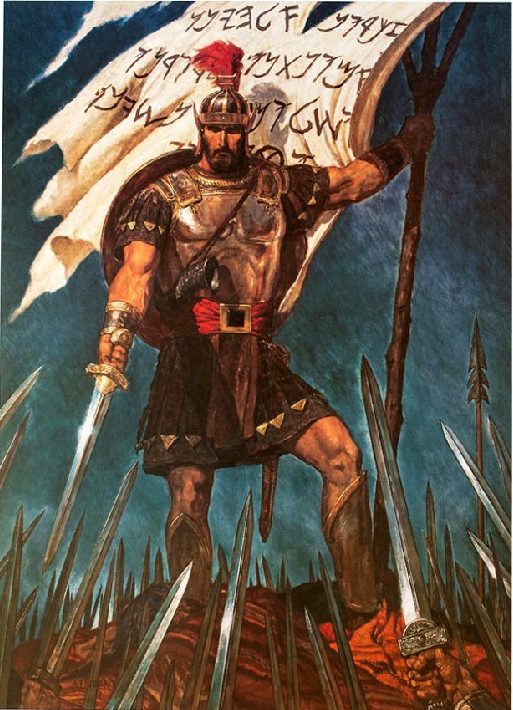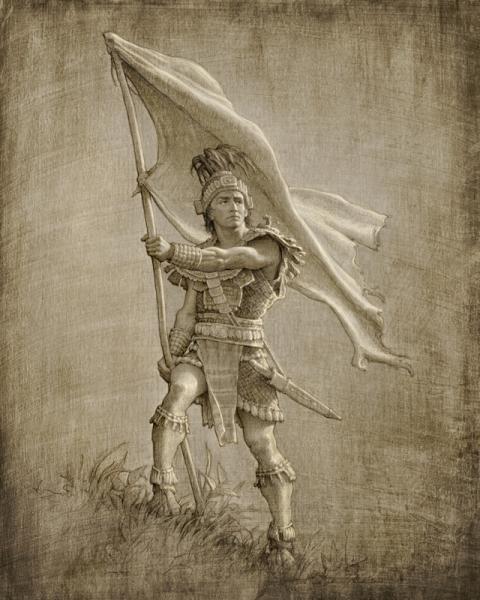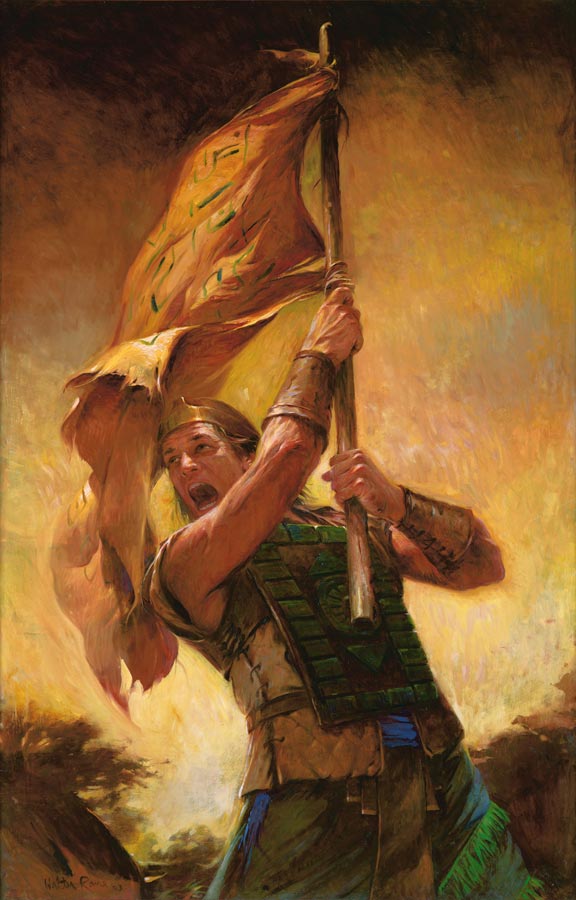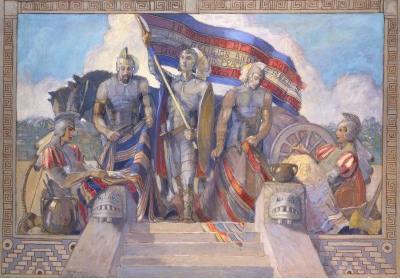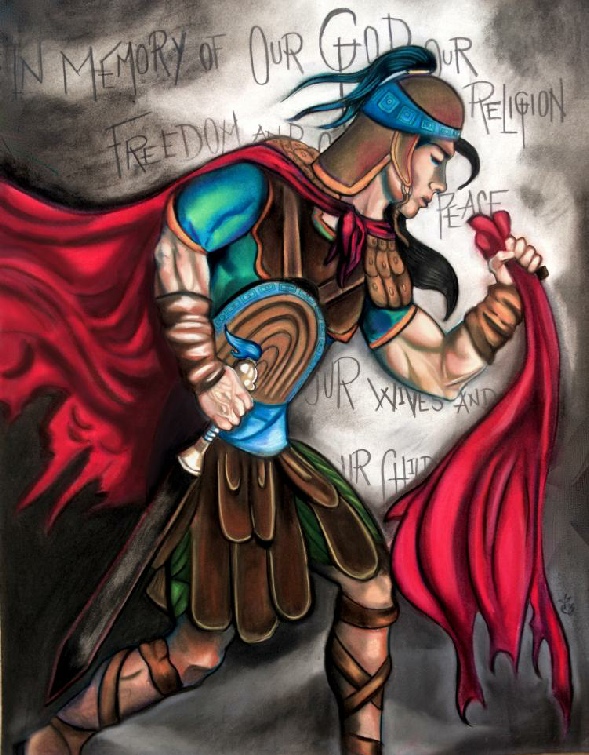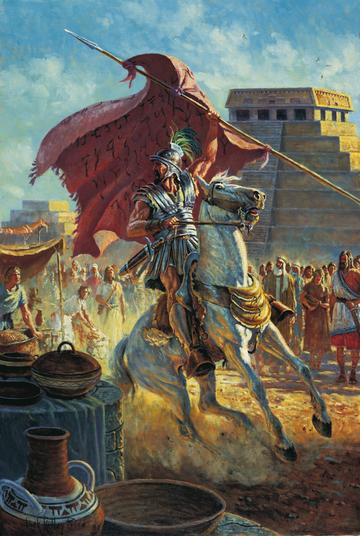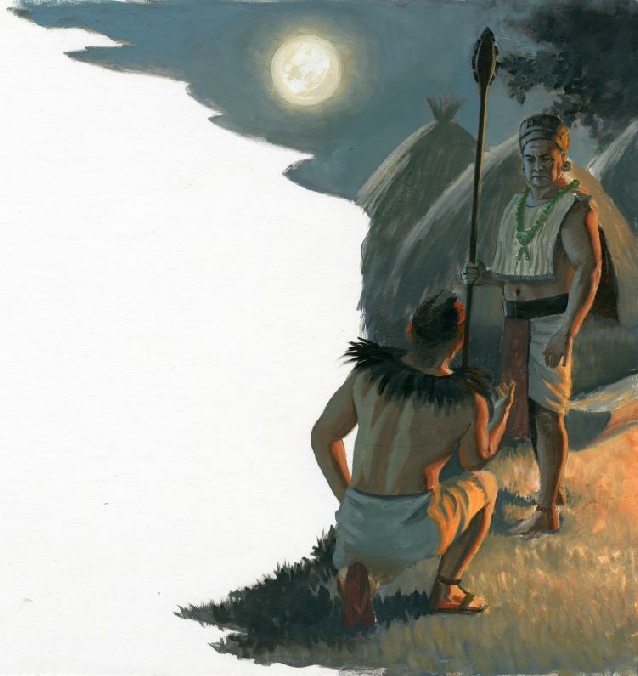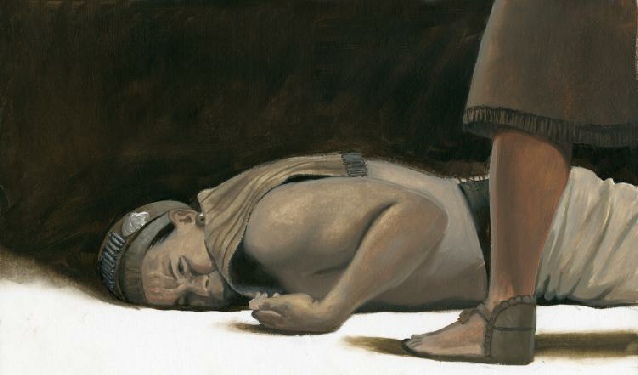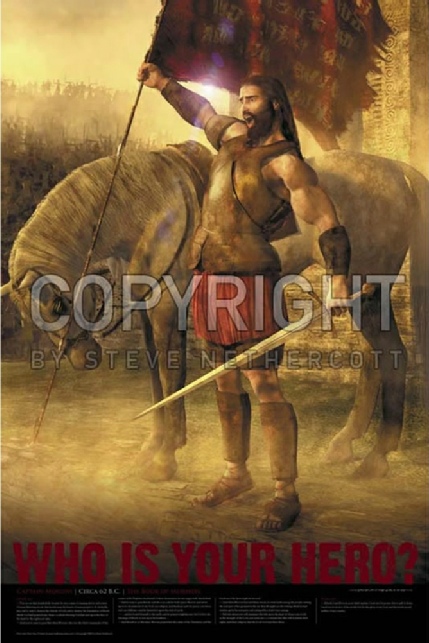






Book of Mormon Feast
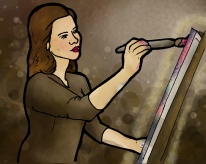
An Artistic Tour of Alma 46-48
Alma 46:12
BOOK OF MORMON ART
Captain Moroni Raises the Title of Liberty
Arnold Friberg
The Book of Mormon records that, though the Nephites enjoyed freedom under a constitutional republic, one man, Amalickiah, wanted to be king. He was joined by many others who wants to exercise power over others.
The Nephite General Captain Moroni took action to educate his people as to their present privileges, and their obligation to fight for their own freedom:
“And it came to pass that he rent his coat; and he took a piece thereof, and wrote upon it – In memory of our God, our religion and freedom, and our peace, our wives, and our children – and he fastened it upon the end of a pole.”
Artist’s Note:
“In the picture, CAPTAIN MORONI RAISES THE TITLE OF LIBERTY, we see yet another towering
figure, that of Captain Moroni, rallying followers to fight for liberty. When this
picture was being considered, it raised a problem concerning Moroni’s writing on
the Title of Liberty. In the English version of the Book of Mormon, we read that
Moroni wrote upon his torn coat, ‘In memory of our God, our religion, our freedom,
and our peace, our wives, and our children:’ We read it in English, but Moroni didn’t
write it in English. He wrote it in the language of his time, probably a version
of Hebrew. There were those who insisted the lettering be in English. But in a picture
of this historical event the artist wanted the writing to look as close as possible
to how it appeared on the actual flag. The nearest anyone could come to the original
language was to go back to Hebrew as it was at the time when Lehi left Jerusalem.
So I went to my friend Rabbi Cardon and asked him to write out the words of Captain
Moroni as it would have appeared at the time of Lehi and Jeremiah. At that time the
squarish lettering we know today as Hebrew had not yet been invented, so they selected
an earlier writing style, closer in appearance to that of the time of Moses. Of course,
more than 500 years had passed between Lehi’s time and that of Moroni. A language
can change a great deal in that time and we have no way of knowing what such changes
might have been. In the painting, as in the book, there is a factor easily skipped
over but of historical importance. We read that Moroni tore his coat and wrote upon
it. This doesn’t mean that in a burst of passion he ripped the coat to shreds. Rather,
his action bears out a long-
“To rend one’s coat was the most extreme emphatic expression of one’s statement or belief, something akin to swearing with a great oath. Some even carried a small knife to make a modest incision, constituting “tearing.” We recall that at the trial of Christ, the high priest “rent his garment” as evidence that there was no further proof required to sentence Christ before the Jews. To carry this custom even further, the men rallying to Captain Moroni’s call, tore their garments and cast them about Moroni’s feet as a token or covenant of the fervency of their support. Such details are carefully shown in the painting. This last point, that of tearing the cloaks, is a strong evidence of the authenticity of the Book of Mormon. For if, as critics claim, Joseph Smith had written the book just as a novel, it is stretching the imagination to believe he could have known such an obscure bit of Israelite ritual.”
Alma 46:13
BOOK OF MORMON ART
BOOK OF MORMON ART
Joseph Franklin Brickey
Captain Moroni used the Title of Liberty to rally his people to fight against the invaders of their country. The Book of Mormon says that “He went forth among the people, waving the rent part of his garment in the air, that all might see the writing which he had written upon the rent part.”
BOOK OF MORMON ART
Walter Rane
Oil on board, 2003. Commissioned.
Captain Moroni, waving the title of liberty, issued a challenge and an invitation:
“Behold, whosoever will maintain this title upon the land, let them come forth in the strength of the Lord, and enter into a covenant that they will maintain their rights, and their religion, that the Lord God may bless them.”
Alma 46:12,13,19,21
BOOK OF MORMON ART
Moroni and the Title of Liberty
Minerva Teichert
“Holding high his rent garment inscribed with the title of liberty, Moroni is framed
on either side by four soldiers–two are kneeling, writing their oaths on their torn
garments, and two stand at Moroni’s side as they rend their garments in covenant.
Probably painted in 1930, the mural reflects Teichert’s beaux-
Alma 46
BOOK OF MORMON MUSIC
“The Title of Liberty”
Marilyn Arnold and Maurine Ozment
Sacred Hymns of the Book of Mormon, 15
The title of liberty Moroni raised high and called for the brave and the strong
To fight or their freedom to worship in peace, the freedom they cherished so long.
Alma 46:12
BOOK OF MORMON ART
The chapters in Alma chronicling Captain Moroni's battles to keep the Nephites free are some of my favorite. I wanted to depict Moroni as the passionate young man he is described as, as a warrior, in the act of rending his coat (or cloak!) with the idea of writing and then raising the Title of Liberty in his mind.
Alma 46:21
Moroni and the Title of Liberty
Clark Kelley Price
Alma 47:12
BOOK OF MORMON ART
Lehonti at Camp on the Mount of Antipas
James H. Fullmer
Alma 47:18
James H. Fullmer
Alma 48
BOOK OF MORMON ART
Steve Nethercott -
At a critical time in the history of the Nephites, the Book of Mormon records that their military commander was Captain Moroni. He was “a strong and a mighty man. He was a man of a perfect understanding, yea, a man that did not delight in bloodshed; a man whose soul did joy in the liberty and the freedom of his country, and his brethren from bondage and slavery.”
